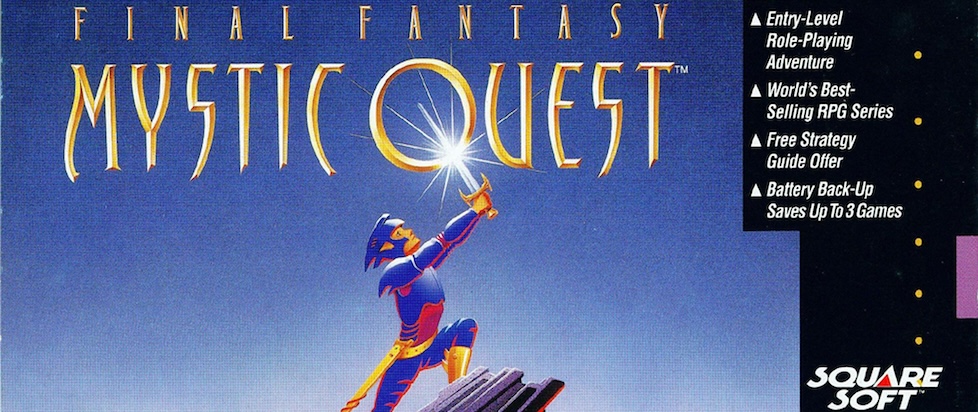
Ode to Benjamin
Who belongs on the Mount Rushmore of Final Fantasy protagonists? Odds are high that most people would select FFVII’s Cloud, mainstay of “greatest character of all time” lists. Terra from FFVI, if not a lock(e), is a strong contender. FFIV’s Cecil could merit inclusion for representing one of the finer RPG redemption arcs. Some might even choose FFX’s polarizing Tidus, whose cringeworthy aspects hardly lessen his moving story of self-actualization and self-sacrifice.
My pick for the pantheon, however, is Benjamin, from the often-overlooked Super Nintendo oddity Final Fantasy: Mystic Quest. Advertised as an “entry-level role-playing adventure,” Square intended FFMQ as introductory fare to cultivate US audiences’ appetite for more complex RPGs. Alas, their overzealous genre simplification efforts grievously underestimated the American gamer’s capabilities, prompting retrospectives to dub FFMQ the worst Final Fantasy and a franchise embarrassment. Whatever its shortcomings, FFMQ should be celebrated for producing one of gaming’s great creations in the prickly, put-upon Benjamin – an existential hero who views his adventure as an absurd joke and a colossal pain in the ass.
From the outset, the game’s sparse script announces no intention to set Benjamin up for success. When Benjamin’s mountain village is destroyed in the game’s inciting incident, a mysterious stranger assures him, “Only you could be the Knight spoken of in the Prophecy.” A monster then attacks, thrusting Benjamin into FFMQ’s first battle, an ostensible combat tutorial where the caprice of random number generation can result in his death. (It happens more often than you’d think.) Surviving the fight nets him no congratulations; the stranger says instead, “Seems I was right! At last I’ve found a true Knight!” Poor Benjamin replies, “But you said you were SURE I was the one!” The tenor of Benjamin’s journey matches this humbling note. He’s not special – he’s available. Less a hero of destiny than a hero of convenience, Benjamin represents the latest in a line of disposable warriors. Is he the Chosen One? Who cares? He’ll do.
The question of who cares shadows Benjamin’s polysemic master gesture, a fourth wall-breaking shrug of surprising emotional versatility. In his frequent moments of bewilderment, disengagement, or incredulity, Benjamin looks toward the screen and lifts his shoulders, his pixelated hands raised like a supplicant soliciting information. It’s as if Benjamin knows he’s being watched, and senses he’s the punchline for cosmic jests too strange or complicated for him to fathom. What the hell is this? he seems to ask of whatever powers may be listening. Why here? Why now? Why me? Whether Benjamin expects a response, or believes he’s owed one, none ever comes. Perhaps that silence is its own answer.

His unanswered questions prove weighty because, in all other circumstances, Benjamin has his affairs under control. It’s something of an unspoken running joke in FFMQ that Benjamin demonstrates preposterous competence in anything and everything he tries. His allies, portrayed as warriors or mages who specialize in might or magic, cannot keep pace with his superior abilities. Benjamin masters any weapon he wields in an instant, be they high-powered explosives or sophisticated mechanical claws that stretch and grab objects from afar. He can command all varieties of magic, from the curative to the destructive, even learning to resurrect the dead after a single skim of the appropriate book. Suffice to say, he’d annihilate any other Final Fantasy protagonist in single combat. (And if he’s merely a makeshift Knight of Prophecy, imagine how ridiculous the real deal must be.) Benjamin amounts to a 16-bit Herbie Popnecker, an immense reservoir of might hidden inside an afterthought of a person. Even so, the universe won’t answer – much less answer to – such a powerful figure. Someone as gifted as Benjamin is nonetheless insignificant at the cosmic scale on which the architects of Prophecy operate.
Benjamin’s true heroism comes from tapping his inner reservoir for the greater good, despite his world’s abundant signals that nothing makes sense and nothing matters. Benjamin could easily be a Bartleby who shirks the call to adventure to wallow in the inconsequence and incomprehensibility of it all. Yet he takes the Herbie route instead, doing God’s work because the gods aren’t going to. After all, if the powers watching from afar won’t deign to answer his questions, who’s to suppose they’ll respond to anyone else? Benjamin therefore strives to do good not only because people need him to, but because there’s nobody else to do it. If not me, we can picture him asking himself whenever there’s a monster to slay or town to rescue, then who?
Yet, much as he shrugs off adversity, so too would Benjamin refuse to shoulder praise. His endgame wanderlust lets him pretend that boredom alone spurs his heroics; that he’ll do what must be done because he has nothing better to do. But we’re wise to his deflections. Even when concealed in the unlikeliest of places, heroism always shines through.
———
Alexander B. Joy hails from New Hampshire, where he used to spend the long winters reading the world’s classics and composing haiku. He now resides in North Carolina, but is plotting his escape. Find him on Bluesky at @aeneas-nin.bsky.social, and see more of his work at https://www.alexanderbjoy.com/




